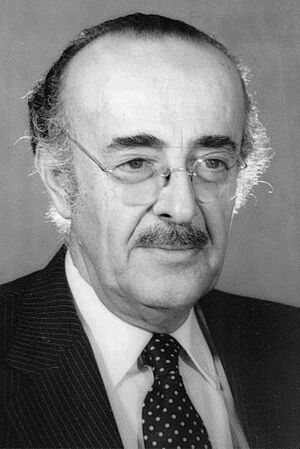Ahmad Sayyed Javadi facts for kids
Quick facts for kids
Ahmad Sayyed Javadi
|
|
|---|---|
 |
|
| Member of the Parliament of Iran | |
| In office 28 May 1980 – 28 May 1984 |
|
| Constituency | Qazvin |
| Majority | 100,717 (53.40%) |
| Minister of Interior | |
| In office 13 February 1979 – 20 June 1979 |
|
| Prime Minister | Mehdi Bazargan |
| Preceded by | Shapour Bakhtiar |
| Succeeded by | Hashem Sabbaghian |
| Minister of Justice | |
| In office 20 June 1979 – 6 November 1979 |
|
| Prime Minister | Mehdi Bazargan |
| Preceded by | Assodollah Mobasheri |
| Succeeded by | Mohammad Beheshti (committee observer) |
| Personal details | |
| Born |
Ahmad Sadr Haj Seyyed Javadi
24 June 1917 Qazvin, Qajar Iran |
| Died | 31 March 2013 (aged 95) Tehran, Iran |
| Political party | Freedom Movement of Iran |
| Relatives | Asghar Sayyed Javadi (brother) |
Ahmad Sayyed Javadi (Persian: احمد صدر حاجسیدجوادی; born 24 June 1917 – died 31 March 2013) was an important Iranian lawyer, political activist, and politician. He served as the Minister of Interior and Minister of Justice in Iran. He was the very first Minister of Interior after the 1979 revolution in Iran.
Contents
Early Life and Education
Ahmad Sayyed Javadi was born in Qazvin, Iran, on 24 June 1917. His family was very religious and included both religious leaders and merchants. He studied hard and earned a law degree. He also received a PhD in political science.
Ahmad was the oldest of three brothers. His brother, Ali, was a journalist for the Kayhan newspaper. Another brother, Hassan, was also a journalist. He was the editor-in-chief of the daily newspaper Ettelaat. Ahmad was also related to Ziaeddin Haj Sayyed Javadi, who was a member of the Majlis (Iran's parliament) when Mohammad Mosaddegh was prime minister.
Career and Political Activities
In 1961, Javadi helped start a group called the Liberation Movement (LMI). He founded it with Mehdi Bazargan, Yadollah Sahabi, and Ayatollah Mahmoud Taleghani. This group aimed to bring about political change in Iran.
Javadi became the prosecutor of Tehran in 1961. He worked in this role for about 18 months. During this time, he joined efforts to fight against corruption in the justice system.
When the Liberation Movement was banned, Javadi became part of the opposition. This meant he was against the rule of Shah Mohammad Reza Pahlavi. After the Six-Day War in 1967, Javadi was one of the people who spoke out about the need for a more just and spiritual society in Iran. He believed that creating an Islamic society could solve many of Iran's problems.
In 1977, Javadi helped create the Iranian Committee for the Defense of Freedom and Human Rights. This group worked to protect people's rights and freedoms. He also worked as a lawyer for important figures like Mahmoud Taleghani and Hasan Nazih. He also defended other well-known people such as Ali Khamenei, Ali Shariati, and Hossein Ali Montazeri during the Pahlavi era.
After the 1979 revolution, Javadi played a role in writing the new Constitution of the Islamic Republic. He was a member of the revolutionary council. He also served as a representative for Qazvin in the first Majlis (parliament) from 1980 to 1984.
Javadi was appointed Minister of Interior in the first government after the revolution. He held this position from February to June 1979. After that, he became the Minister of Justice in June 1979. He served as Justice Minister until November 1979, when the interim government resigned.
Javadi was also a co-founder of the Freedom Movement. This was another important opposition group. He was a key member of its central council.
Later Years and Activism
In 1985, Javadi faced difficulties because of his criticisms of the government. He was arrested again in 2001 for his political activities, even though he was 81 years old.
In April 2009, Javadi and other activists spoke out against the death penalty for young offenders in Iran. In May 2011, he wrote a letter to Ali Khamenei, Iran's supreme leader. In the letter, he said Khamenei was responsible for events in Iran and criticized his support for the president at the time. The next month, he wrote another letter to Iranians, apologizing for his role in helping to establish the government.
In May 2012, Javadi and four other important political activists wrote a letter to Ali Khamenei. They shared their worries about the arrests of opposition figures in the country. In July 2012, the Iranian government prevented Javadi from traveling outside the country.
Awards and Recognition
In 2009, Ahmad Sayyed Javadi received the Golden Pen Award. This award was given to him by the Association for Defense of the Freedom of the Press.
Death
Ahmad Sayyed Javadi passed away in Tehran on 31 March 2013, at the age of 95.
 | Stephanie Wilson |
 | Charles Bolden |
 | Ronald McNair |
 | Frederick D. Gregory |

